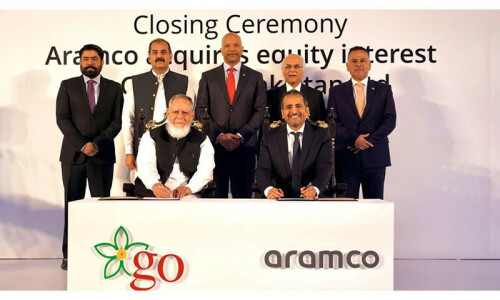THE ministries of water and petroleum have proposed an interim utilisation of the over 200mmcfd of mostly low BTU gas available at various gas fields by setting up gas-based power plants at wellhead or near transmission lines.
Under the proposal, moveable power plants can be established relatively quickly. And such gas could not be injected into the pipeline system quickly without the establishment of gas production and transmission infrastructure. These power plants envisage reducing the ongoing power load-shedding and adding value to the national economy.
In this regard, a policy framework submitted by both the power and petroleum ministries was approved during a recent ECC meeting. The petroleum ministry was required to provide details of gas that is available, including the location of gas fields, volume of gas and specification, and the applicable wellhead gas price.
The petroleum ministry announced last month that the government had allowed the installation of power plants on 46 gas fields; they would utilise 280mmcfd gas and increase power production by 1,000MW.
Three distribution companies (discos) — Iesco, Sepco and Hesco — have invited separate bids from companies for development of on-site gas-based power projects. In all, if nine gas wellhead power plants materialise, they would add 750MW to the generation capacity. Gas would be available for one year for three plants, for two years to four plants and for three years to two projects.
The petroleum ministry announced recently that the government had allowed the installation of power plants on 46 gas fields; they would utilise 280mmcfd gas and increase power production by 1,000MW
Sepco and Hesco have separately invited bids for short-term power generation projects of various capacities (up to 400MW each) that will be based on pipeline-specification gas at various sites under the discos’ respective jurisdictions. However, the names of these wellhead sites have not been disclosed.
Besides, Hesco has also invited bids for short-term power generation projects of up to 600MW based on pipeline gas at Genco-I’s Jamshoro thermal power plant. As a result, bids have been invited for a total of 2,150MW worth of plants.
According to details, the bidder will be responsible for the construction, operation and maintenance of the power generation complex, gas pipelines and transmission lines up to the designated interconnection point. The project will be required to achieve commercial operations within 100 days of the signing of the EPA. The bidder will be responsible for financing and constructing the project.
The Private Power and Infrastructure Board (PPIB) normally appraises and calls the bids.
Now, the three discos would do the job. It is feared that these discos may lack the high level of expertise required for handling the new critical activities.
According to newspaper reports, there will be no implementation agreement with the government, no sovereign guarantee and no mobilisation advance. This is a major departure from the earlier prescribed procedures for independent power producers. This may make loan or equity financing difficult.
Then, it was reported that the tariff will not have any capacity or fixed charges, and that there will be no adjustments or indexations or pass-through on any account. Again, this is a major departure from the past standard practices and may not find favour with the financiers.
Agreements for energy purchases and fuel supply have evolved over the years. The incentives and exemptions have been reflected in these agreements as part of the overall security package offered by the government to attract investors.
The drafting of these agreements under the new framework may not be very difficult, but the real issue will be their acceptability to the financiers and investors. Normally, nothing moves until the investors are satisfied with the set of required documents.
Owing to a number of factors, the interim projects may perhaps be difficult to implement.
The government is urged to consider these factors, which include: assuring security of the plants, pipelines and the personnel engaged in power generation; moveable plants offer poor loan security unless they are supplemented by other, more dependable collateral that is acceptable to the financiers; such gas fields in KP and Balochistan may also be given a chance; operative IPPs are not getting paid and they have a number of problems; and transparency in the whole process would help in attracting investment from lenders.
Published in Dawn, Economic & Business, January 12th, 2015
On a mobile phone? Get the Dawn Mobile App: Apple Store | Google Play














































Dear visitor, the comments section is undergoing an overhaul and will return soon.